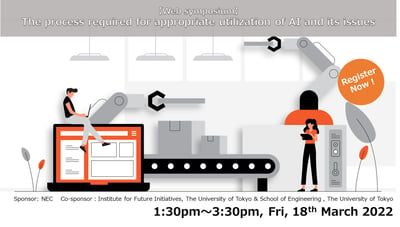EVENT
- 2022
Web symposium : The process required for appropriate utilization of AI and its issues

| In the era of digital transformation (DX), artificial intelligence (AI) is rapidly becoming ubiquitous and being used widely in society amidst major corporate and social transformations. The widespread use of AI, however, is also bringing with it new concerns and challenges. In light of this situation, NEC and the University of Tokyo started collaborating in 2021 on a three-year project under which interdisciplinary investigations are conducted on various themes such as risk management, appropriate regulations against AI and data we should focus for coming AI society. At last year's symposium*1, the presentations and panel discussions on the research findings indicated that a focus on “process” to ensure the safe implementation of AI was a common thread through the entire project. In this year's symposium, we will have presentations from members in University of Tokyo who have been working on the themes this year. Then, we will have panel discussion including Q&A to discuss some topics such like the "process” necessary for the safe implementation of AI and points corporations and Japan society should strengthen. Outline of the meeting |
Date: Friday, March 18, 2022 1:30pm to 3:30pm
Venue: Online
Zoom (The connection ID will be provided after the application form has been submitted.)
Hosts: NEC (sponsor)
Institute for Future Initiatives, The University of Tokyo (co-sponsor)
School of Engineering, The University of Tokyo (co-sponsor)
Fee: Free of charge
Register: Please refer the following site
https://jpn.nec.com/event/220318ai-elsi/index.html
Presenters
| Affiliation | Name |
| Professor, Director, Institute for Future Initiatives, the University of Tokyo | Hideaki Shiroyama |
| Professor, Graduate Schools for Law and Politics, The University of Tokyo | Joji Shishido |
| Associate Professor, Institute for Future Initiatives, The University of Tokyo | Arisa Ema |
| Project lecturer, Institute of Business Law and Comparative Law & Politics (IBC), Graduate Schools for Law and Politics, The University of Tokyo |
Ryo Ogawa |
| Professor, School of Engineering, The University of Tokyo | Yukio Ohsawa |
| Lecturer, Graduate School of Engineering, The University of Tokyo | Teruaki Hayashi |
| General Manager, Global Innovation Strategy Division, NEC Corporation | Hiroto Sugawara |
Program
| Time | Topics and |
| 1:15– | Reception desk opens |
| Opening | |
| 1:30–1:45 | Opening remarks and introduction to the aim of this year's activities: Hiroto Sugawara Presentation topic: In recent years, the evolution and development of artificial intelligence (AI) has been remarkable, but at the same time we are facing issues and challenges unlike any we have ever seen before. Last year, NEC started discussions on the risk management and social acceptability of AI through interdisciplinary investigations that leverage the knowledge of the University of Tokyo. In this presentation, I will give an overview of the activities, which are now in their second year, conducted by NEC together with the University of Tokyo and introduce the relationship between these activities and NEC's business activities. |
| 1:45–2:00 | The aim of implementing risk management in AI-based services: Arisa Ema Presentation topic: With the implementation of artificial intelligence (AI) in various fields, developers and service providers must address issues pertaining to the safety and fairness of AI solutions. To put into practice the national and corporate principles and guidelines of AI, discussion and the design of incentives within these organization are important. In this presentation, I will discuss with audience how the framework (Risk Chain Model) being researched and developed by the University of Tokyo, can be utilized for education and training in organizations. |
| 2:00–2:15 | The evaluation axis of Japanese residents on remote biometric authentication: Ryo Ogawa Presentation topic: The European Commission published its proposal for a Regulation on Artificial Intelligence in which it stipulates that all AI systems for remote biometric authentication of natural persons are strictly regulated. So what regulations are appropriate in Japan? As a foundation for thought, we conducted a social survey to find out what kind of evaluation criteria people in Japan attach importance on biometric authentication systems. In this presentation, I will give an overview of the survey and discuss its implications for Japanese society. |
| 2:15–2:35 | Significance and Challenges of Unexplored Data Design in AI: Teruaki Hayashi Presentation topic: The progress of AI technology has led to implementation of variety of solutions, those are utilizing multiple types of data, in our real world. However, we still understand only a small part of the real world, and only a small part of that has been converted into data and used. In this presentation, I will discuss significance and challenges of unexplored data design in AI by uncovering potential data that has not yet associated with dynamical human perception or knowledge and introducing topics about social acceptance and ethical issues for new AI, examples digitizing unobserved events and decision support. |
| 2:35–3:25 | Panel discussion: Hideaki Shiroyama (coordinator) Panel discussion topic: Based on presentations in the first half, the panelists will discuss the “process” required for appropriate utilization of AI and its issues, such like points corporates and Japanese society should strengthen. |
| 3:25–3:30 | Closing remarks |
*The contents are subject to change.

